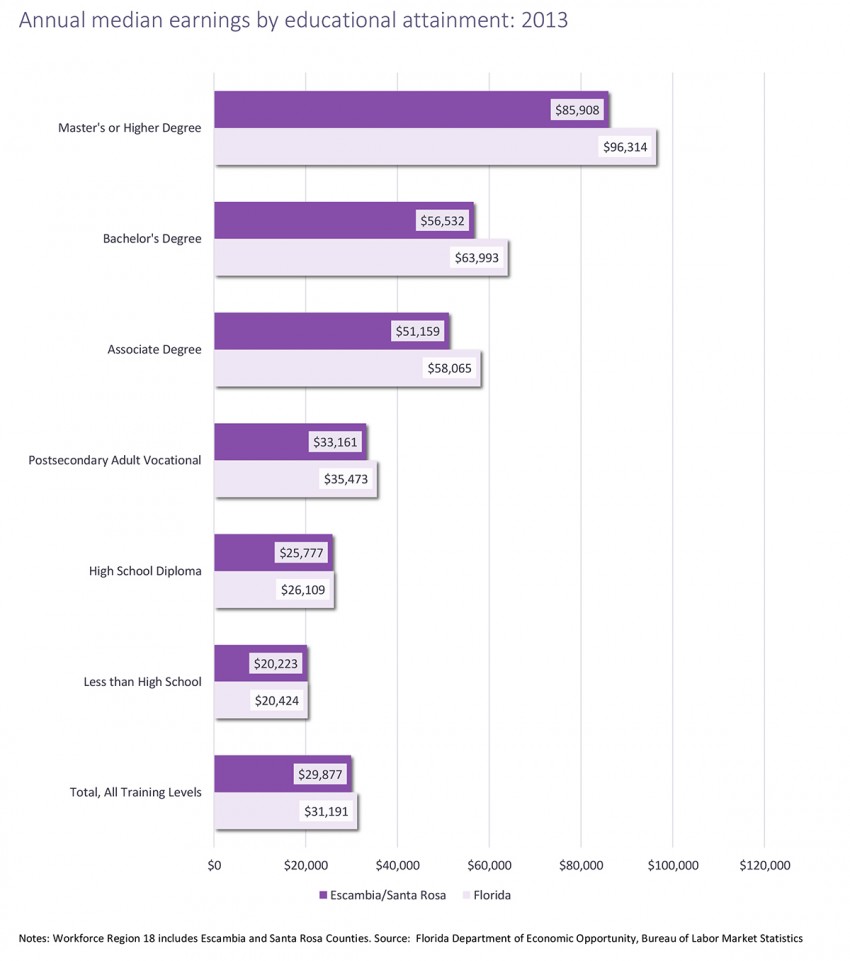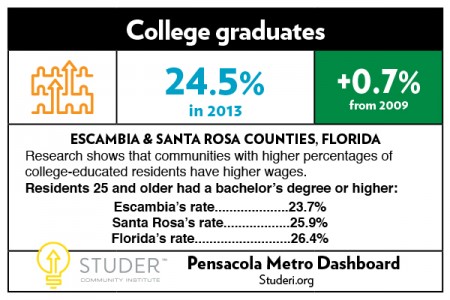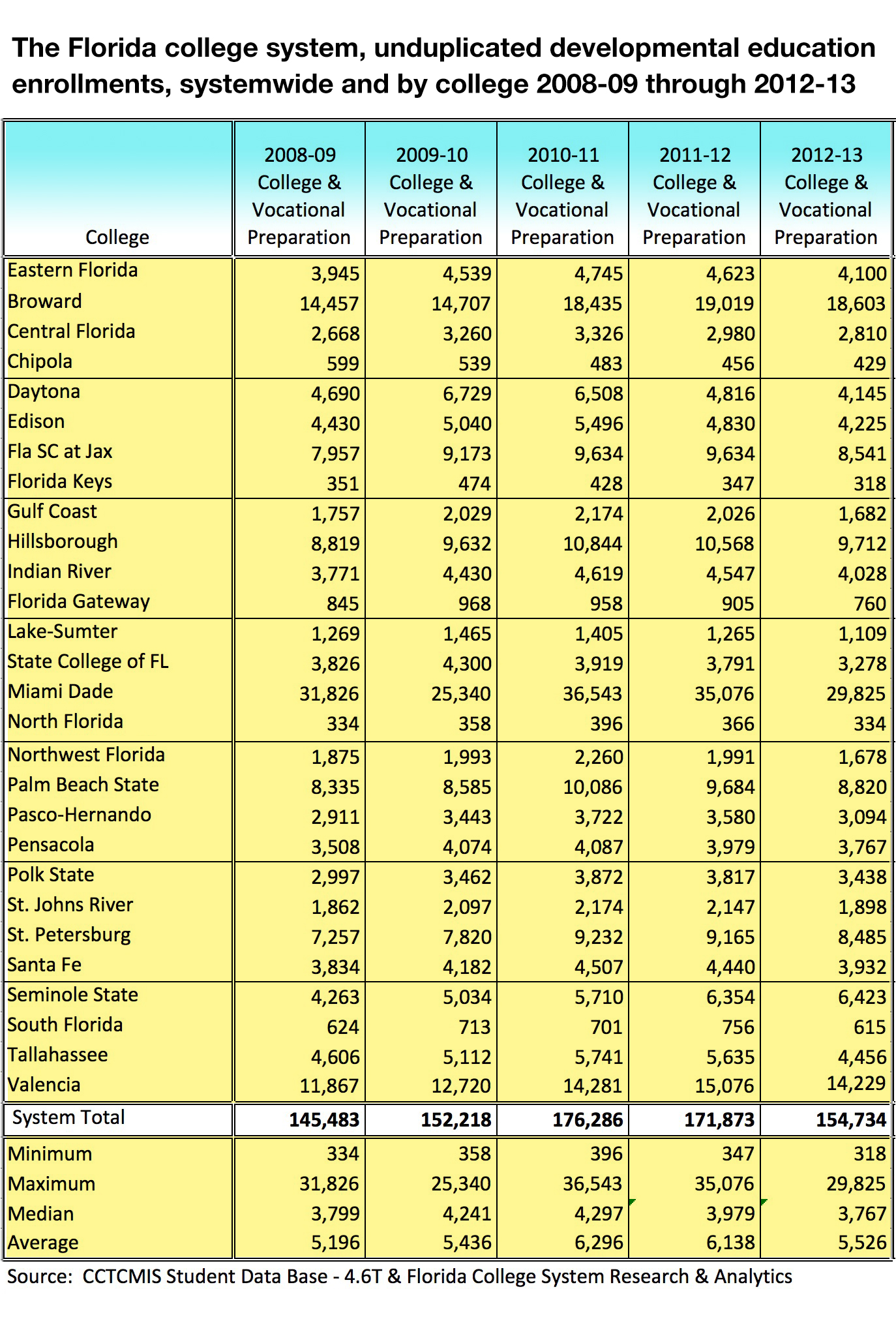How PSC, UWF help students be
- January 21, 2016
- / Shannon Nickinson
- / education

Pensacola State College.
It’s part of Tracy Peyton and Kirk Bradley’s job to help new students at Pensacola State College make the grade.
Peyton, who oversees the English and communications department, and Bradley, who oversees the math department, are part of the faculty team that has worked hard to knit together a safety net under students who may not be ready for the workload in college.
The number of college graduates in the community is one of 16 metrics in the Studer Community Institute's Pensacola Metro Dashboard, a set of education, economic and social data points that gauge the community's well-being.
Their work took on extra urgency after a 2013 state law exempted students who graduated from a Florida high school after 2007 from having to take a placement test that for years helped guide placing students who needed extra help in remedial, or developmental education, courses.
Those students may ask to take the test and they may opt to enroll in the remedial classes, but they don’t have to. The assumption being, if you have a Florida high school diploma, you are college ready.
That wasn’t always the case both at Pensacola State and across the State College system.
— In 2012-2013 school year (most recently available through DOE reports online for the state college system), 3,767 students of PSC’s 21,676 students were enrolled in at least one developmental education course. That is 17.4 percent of the student body. Many students, it notes take more than one such course.
In 2008-2009 school year, it was 16.3 percent.
— Across the state college system in 2013, 18.3 percent of students had at least one developmental course. In 2008-09, 16.7 percent of students took developmental courses.
— Compared to other state colleges, PSC is on par with what other state colleges of comparable size see.
Reggie Dogan, Studer Community Institute Fellow
The University of West Florida doesn’t have remedial courses per se, say school officials, because all students must meet admissions standards.
But there are programs in place to help students who are struggling to carry the weight of college-level work.
Kim LeDuff is chief diversity officer and associate vice provost for University College, which offers incoming freshmen with first-year advising and help with general education courses. They also help students with undecided majors figure out what they may want to major in.
— TRiO: TRiO serves UWF students who self-identify as first generation, low-income or disabled with support services that will encourage personal development and success on the journey to graduation and beyond. The program supports students from making the transition to university life through graduation and beyond by offering academic advising and social support.
LeDuff says that TRiO serves 200 students at a time and TRiO students have an 86 percent persistent rate, which means they don’t drop out or fall into academic suspension.
TRIO Student Support Services has been in place at PSC for more than 30 years. It helps 225 first-generation, low-income students and students with disabilities succeed with free academic tutoring, academic advising, career counseling, financial aid counseling, transfer counseling and even social/personal counseling.
TRIO-SSS students at PSC also have access to financial literacy activities and peer coaching. Last year, TRIO-SSS students persisted at a rate of 79 percent, 99 percent of them remained in good academic standing, 51 percent completed a college program and 55 percent of those who graduated, transferred to a four-year university to continue their studies.
— 21st Century Scholars: The mission of 21st Century Scholars is to identify undergraduate students who will benefit from additional academic and social support. Through tutoring, workshops, small group meeting and success coaching, the program encourages the development of learning strategies and non-cognitive skills that will serve them well as they make the journey to graduation and life beyond college.
Students in the program meet with success coaches who help them adapt to culture of university. It serves up 100 students and has an 83 percent persistent rate.
— Academic Center for Excellence: The center is a tutoring lab that provides free academic support services to all students enrolled at the university. It offers individual tutoring, group tutoring and quiet study spaces. They make about 1,000 appointments per semester.
Peyton says the placement test was helpful in that it helped identify general areas of weakness in students.
“In the gateway courses, we do give all students coming in a diagnostic test designed to test prerequisite skills we expect and we give it to every student,” Peyton says. “In English, fewer patterns than I would have thought.”
Bradley says students also get diagnostic testing to find the skills they may need to work on.
“In math, the important thing is consistency,” Bradley says. “If you don’t use it for a while, it’s not fresh in your mind. You need to do it everyday.”
To help bridge the gap, Peyton says the college has added staff to math and writing labs, put the skills review material online, so students can get help face to face or online.
Virtual tutoring, Bradley says, is improving access to help and has been a good resource for students.
“We’ve expanded writing lab hours as well to help make sure students get the support they need,” Peyton says.
It’s an emphasis that will continue as the State College System relies on performance-based metrics to determine state funding.
The first round of that was not overly kind to PSC, which saw $613,000 of its $34 million in base funding from the state held back based on its report card. The College has recaptured half of that amount as a result of an implementation plan, and hopes to receive the other half at the end of spring term as a result of its improvements.
College officials are enacting efforts to improve the four key areas in which the colleges will be ranked — and funded: student completion rate, student retention rate, job placement, continuing education for graduates and entry-level wages.
PSC’s completion rate was 35 percent; the state average was 43 percent. Improving that, and the other performance metrics, is important to PSC’s financial bottom line and its educational mission.
It is also crucial for improving the quality of life in the Pensacola area.
Data from the Florida Department of Economic Opportunity shows that with a two-year degree, workers in the Pensacola metro area earn a median wage of $51,159.
With just a high school diploma, a worker’s median wage is $25,777.

Annual median earnings by education attainment for 2013 according to data from the Florida Department of Economic Opportunity.
That’s money and prosperity and options for a better life left behind — for all of us.


 CivicCon launches with a look at good growth in cities
CivicCon launches with a look at good growth in cities
 Building stronger brains one baby, one parent at a time
Building stronger brains one baby, one parent at a time
 SCI debuts commercial on Early Learning City
SCI debuts commercial on Early Learning City
 Entrecon: World class speakers and an opportunity to sharpen skills
Entrecon: World class speakers and an opportunity to sharpen skills
 PYP Quality of Life survey 2017
PYP Quality of Life survey 2017
 EntreCon Pensacola 2016: A look back
EntreCon Pensacola 2016: A look back
 Leadership tip: getting better employee takeaways
Leadership tip: getting better employee takeaways
 Leadership tip: be interested instead of interesting
Leadership tip: be interested instead of interesting
 Leadership tip: delivering difficult messages
Leadership tip: delivering difficult messages
 Brain Bags boost Arc, Early Childhood Court programs
Brain Bags boost Arc, Early Childhood Court programs